MobileVillage (MV) and Appcelerator (APP) bring you a quick read of the biggest mobile apps news and other mobile tech news stories. In this week’s mobile news roundup: Apple release schedule changes, new iPad Pro likely, iPad sales, Intel smart glasses, Facebook Spaces VR, BBC Earth VR, Winter Olympics VR & AR, HP VR, RealWear wearable computer, Asus ZenBook 13 with Nvidia, new Galaxy S9 photos, Pixel Visual Core, 3D SDK and more.
Facebook Spaces VR comes to Messenger groups
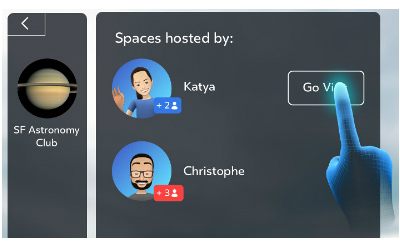 Facebook is pushing users to interact more with friends and family, and its latest move helps you do that in virtual reality. Although Facebook’s Spaces VR app was launched last year as a place for you to virtually hang out with friends and family, now you can also use it with people in your Facebook Groups.
Facebook is pushing users to interact more with friends and family, and its latest move helps you do that in virtual reality. Although Facebook’s Spaces VR app was launched last year as a place for you to virtually hang out with friends and family, now you can also use it with people in your Facebook Groups.
You can host or join a VR Space with up to four people from a Group, for example to just chat, watch a show together, or practice or perform together with VR props if you’re all part of a music or a comedy group. The app even lets you livestream your performance to friends. For now, Spaces is only available to you if you have an Oculus Rift or HTC Vive VR headset. — MV
BBC Earth VR app debuts
 In related mobile apps news, Britain’s BBC has teamed with Google to create the free BBC Earth: Life in VR app. In this BBC Earth VR app (pictured above), you’ll swim along the Pacific coast in California, following a mother sea otter as you explore reefs, kelp forests, sea trenches, and other ocean animals.
In related mobile apps news, Britain’s BBC has teamed with Google to create the free BBC Earth: Life in VR app. In this BBC Earth VR app (pictured above), you’ll swim along the Pacific coast in California, following a mother sea otter as you explore reefs, kelp forests, sea trenches, and other ocean animals.
The BBC Earth VR app is available for Daydream View headsets and phones. And if you have a Gear VR or Oculus Rift headset and fancy bugs, bears or wild cats, you can also try out three other BBC Earth VR apps created for those platforms. — MV
Winter Olympics VR & AR apps
 The future of augmented reality news is upon us, as last week The New York Times debuted its first ever AR-enabled article for iOS 11. The AR story features top athletes from the Winter Olympics, and allows you to “place” them in your room and view their technique from every angle, while learning facts about their skills. The Times is already planning to bring more virtual experiences to readers.
The future of augmented reality news is upon us, as last week The New York Times debuted its first ever AR-enabled article for iOS 11. The AR story features top athletes from the Winter Olympics, and allows you to “place” them in your room and view their technique from every angle, while learning facts about their skills. The Times is already planning to bring more virtual experiences to readers.
The Washington Post has also created an AR experience for iOS, but it’s a unique game where you can select matches between athletes in different disciplines (a skier vs. bobsledder, for example), guess who will be faster, and then watch the race on a 3D track projected in your real environment. The Washington Post has created a few AR experiences before, including an inside look at famous buildings.
For even more Olympics immersion, you can watch 30 events in virtual reality, including 50 hours of live Olympics VR broadcasts and the Closing Ceremony. You don’t even need a VR headset—just download the NBC Sports Olympics VR app for iOS or Android. But for the full Olympics VR experience and livestreamed events, you’ll need a Gear VR, Oculus, Google Daydream, Google Cardboard, or Windows Mixed Reality VR headset. You can find NBC’s full Winter Olympics VR schedule and links here. — APP & MV
Apple release schedule now focused on quality, not speed
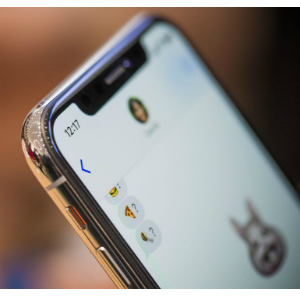 For years, Apple has become known for speedy, splashy new product releases or upgrades. But now, the company is upgrading its upgrade schedule. Instead of a relentless Apple release schedule with tons of new products or features, Apple engineers will have more discretion to delay new features that aren’t as polished, according to Bloomberg in a new feature story about the Apple release schedule and upcoming releases.
For years, Apple has become known for speedy, splashy new product releases or upgrades. But now, the company is upgrading its upgrade schedule. Instead of a relentless Apple release schedule with tons of new products or features, Apple engineers will have more discretion to delay new features that aren’t as polished, according to Bloomberg in a new feature story about the Apple release schedule and upcoming releases.
Bloomberg reports that this fall, we can still look forward to lots of new Apple software upgrades. The biggest change—which we reported last month—is progress toward a unified set of apps that work on iPhones, iPads and Macs. Apple is also creating a Digital Health tool to show parents how much time their children have been staring at their screen, and improvements to its Animoji animated emoji characters that are currently limited to iPhone X users. — MV
iPad sales still dominate; New iPad Pro expected
Apple’s iPad sales still dominated the tablet market last year, as more iPads were sold than Samsung and Amazon tablets combined. According to a new IDC report on iPad sales, Apple moved 43.8 million iPads and took a staggering 26.8 percent share of the tablet market in 2017. That means that one out of every four tablets sold worldwide was an iPad. By comparison, Samsung shipped 24.9 million tablets, while Amazon sold 16.7 million devices.
Apple’s red hot iPad sales are unlikely to slow down this year, as the company is expected to launch a new iPad Pro with features mirroring that of last year’s iPhone X release. The new iPad Pro is said to feature a nearly bezel-less design, Apple’s patented Face ID tech and the removal of the physical home button. If tradition holds, Apple will likely reveal the new iPad Pro and other new iPads at the company’s annual WWDC event in early June. — APP & MV
Intel smart glasses look like real glasses
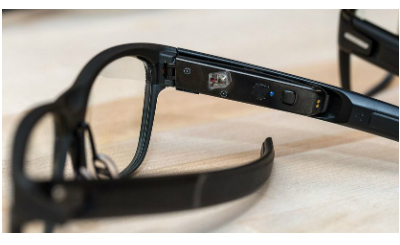 Intel announced a prototype of its smart glasses called Vaunt, which may be the first smart glasses that look nearly like regular glasses. In the Intel smart glasses, all of the electronics are packed inside the thin plastic stems. The Vaunt smart glasses pair with your iOS or Android phone and contain a processor, Bluetooth chip, accelerometer and compass. The glasses use a very low-powered laser that shines a red, low-fi image into your eye to show you notifications, directions or other information overlaid on your surroundings, at the bottom of your field of vision.
Intel announced a prototype of its smart glasses called Vaunt, which may be the first smart glasses that look nearly like regular glasses. In the Intel smart glasses, all of the electronics are packed inside the thin plastic stems. The Vaunt smart glasses pair with your iOS or Android phone and contain a processor, Bluetooth chip, accelerometer and compass. The glasses use a very low-powered laser that shines a red, low-fi image into your eye to show you notifications, directions or other information overlaid on your surroundings, at the bottom of your field of vision.
Unlike other smart glasses there’s no camera in the Vaunt, so they aren’t for spy photos or scanning the public for known criminals, as police in China are now doing with special smart glasses. You can see how the Vaunt Intel smart glasses work in The Verge‘s demo video. — MV
RealWear wearable computer pulls in $17 million
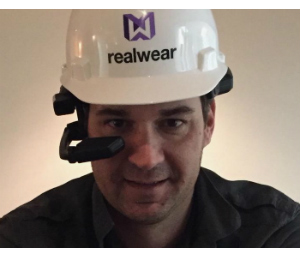 Vancouver, Canada based RealWear has raised US $17 million to produce more of its small, hands-free wearable computer aimed at workers in construction and other heavy industries. The HMT-1 is a Android based wearable computer that fits into any type of headgear, such as industrial head bands and helmets. The HMT-1 offers voice control, remote mentor video calling, document navigation, workflows, mobile forms, and connected devices data visualization in ten languages. RealWear says its wearable computer can stay powered up to 12 hours, and has more processing power and memory than many other wearable tablet devices or smart glasses.
Vancouver, Canada based RealWear has raised US $17 million to produce more of its small, hands-free wearable computer aimed at workers in construction and other heavy industries. The HMT-1 is a Android based wearable computer that fits into any type of headgear, such as industrial head bands and helmets. The HMT-1 offers voice control, remote mentor video calling, document navigation, workflows, mobile forms, and connected devices data visualization in ten languages. RealWear says its wearable computer can stay powered up to 12 hours, and has more processing power and memory than many other wearable tablet devices or smart glasses.
So far, RealWear has shipped thousands of its wearable computer and it is now making about 1,000 a week. RealWear is also working to release another model of the HMT-1 that meets Class 1 Division 1 and ATEX Zone 1 certifications, meaning it cannot ignite in potentially explosive environments. The company–which has 70 employees—was started in 2016 by Andy Lowery (pictured) after he left his position as president of AR glasses maker Daqri, a company we also recently covered in a “Mobile Week” issue. — MV
HP VR headset updated, VR Launch Kit launched
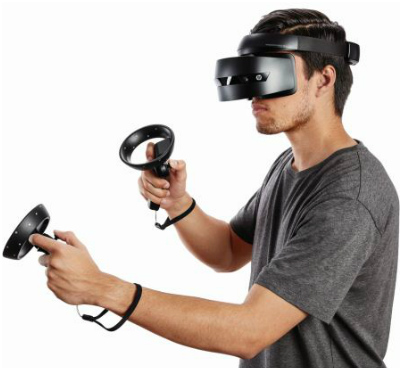 Want a low-cost VR headset for business use? HP has updated its Windows Mixed Reality Professional Edition headset, to be released in March. Like the original model, this HP VR headset has a 1,440 by 1,440 pixel display for each eye. But the updated version comes with three easily cleanable replacement face plates, which is important for multiple users. The HP VR headset comes with mixed reality controllers and costs US $449, which is less than the HTC Vive Business Edition ($1200) and Oculus Rift for Business ($900).
Want a low-cost VR headset for business use? HP has updated its Windows Mixed Reality Professional Edition headset, to be released in March. Like the original model, this HP VR headset has a 1,440 by 1,440 pixel display for each eye. But the updated version comes with three easily cleanable replacement face plates, which is important for multiple users. The HP VR headset comes with mixed reality controllers and costs US $449, which is less than the HTC Vive Business Edition ($1200) and Oculus Rift for Business ($900).
HP and Epic Games has also announced HP VR Launch Kit for moving architectural data sets into VR visualization. Based on the popular Unreal Engine VR platform, it employs the Datasmith5 workflow toolkit by simplifying how 3D assets are optimized for Unreal. The HP VR Launch Kit also gives you examples of how well your creations would run on different hardware profiles, and determines the ideal hardware configurations you’d need. — MV
Asus ZenBook 13 — Thinnest laptop with a dedicated GPU
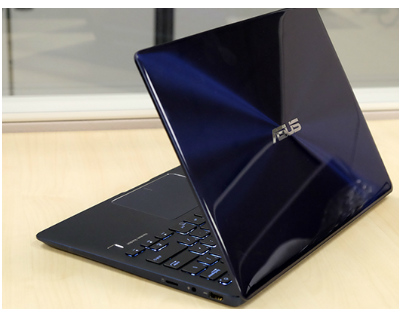 The new crazy thin and light Asus ZenBook 13 UX 331 Ultrabook shown off at CES last month now has a dedicated GPU—making it the world’s thinnest laptop with a discrete GPU. Unlike the Intel UHD cards found in other Intel Ultrabooks, the new Asus ZenBook 13 includes a Nvidia GeForce graphics card, which should deliver more power for games, AR apps, video editing and other high-GPU tasks.
The new crazy thin and light Asus ZenBook 13 UX 331 Ultrabook shown off at CES last month now has a dedicated GPU—making it the world’s thinnest laptop with a discrete GPU. Unlike the Intel UHD cards found in other Intel Ultrabooks, the new Asus ZenBook 13 includes a Nvidia GeForce graphics card, which should deliver more power for games, AR apps, video editing and other high-GPU tasks.
The new Asus ZenBook 13 UX is only 1.19 to 1.4 cm (0.47-0.55 inches) thick and weighs just 1.12 kg (2.47 pounds). It has an Intel Core i5 or i7 processor, 8 or 16 GB of LPDDR3 memory, 256 or 512GB SSD and 13.3″ FHD (1920 x 1080) touchscreen. The Asus ZenBook 13 UX 331 starts at US $999. Singapore Hardware Zone is first with a review, calling it “great bang for your buck”. — MV
More Samsung Galaxy S9 photos leaked
Rose gold is so 2015. New leaked photos of the Samsung Galaxy S9 and Galaxy S9 Plus show off what might be the next big smartphone color trend: Lilac Purple. Aside from the bold new color, the photos also provide our first glimpse at the phone’s redesigned fingerprint sensor. Last year’s Galaxy model saw the fingerprint sensor placed in an awkward spot on the back of the phone. The new fingerprint sensor appears to be located directly below the camera, of which the Plus version of the phone appears to have two.
Samsung has been working hard across devices to improve its camera experience, and last week announced new image sensors and software that will bring portrait mode to cheaper smartphones. The “bokeh” effect tech that creates the blurry backdrop for mobile portraits has long been reserved for flagship devices, but soon Samsung said mid-tier and even some entry-level smartphones may have this capability. Samsung is officially set to unveil its next lineup of Galaxy devices at Mobile World Congress on February 25th. — APP
Pixel Visual Core aims for better third-party app photos
Google’s Pixel Visual Core processor and HDR+ technology located in the camera app allows Pixel 2 and Pixel 2 XL users to take high quality photos even in extremely poor light. It leverages machine learning and computational photography to make photos more picturesque. Now, Google has provided an update that will bring HDR+ processing to third-party apps, meaning your Snaps and Instagram posts will also now benefit from this feature. The update enabling Pixel Visual Core for third-party apps is now available. — APP
Matterport 3D SDK ready for developers
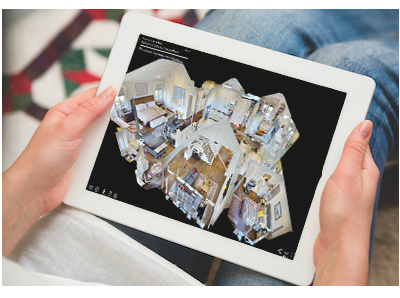 3D media technology company Matterport now has a 3D SDK available for free to select developers. The company’s 3D Showcase SDK includes an immersive capture camera and integration with Google Street View for VR apps and websites. Matterport’s 3D SDK targets the travel, hospitality, retail, real estate, architecture, engineering and insurance industries. Construction documentation company Multivista has already used the 3D SDK to create an app that lets customers to virtually walk through construction sites. — MV
3D media technology company Matterport now has a 3D SDK available for free to select developers. The company’s 3D Showcase SDK includes an immersive capture camera and integration with Google Street View for VR apps and websites. Matterport’s 3D SDK targets the travel, hospitality, retail, real estate, architecture, engineering and insurance industries. Construction documentation company Multivista has already used the 3D SDK to create an app that lets customers to virtually walk through construction sites. — MV
HTC smartphone president resigns
On the heels of selling its Pixel team to Google, Taiwan’s HTC has also just lost its smartphone lead. Chialin Chang, who joined the company as CFO in April 2012, immediately resigned this week as the President of HTC’s Smartphone and Connected Devices Business. HTC hasn’t said who will take over that role, but the company has now asked five of its Vive VR general managers to also lead the company’s smartphone operations in their respective regions. For his part, Chang plans to set up an AI startup later this year.
In its latest quarterly results, HTC reported a net loss of $103 million in Q3 2017, which is its tenth consecutive loss. According to Taiwanese analysis firm TrendForce, last year HTC’s smartphone production volume saw a sharp decline to under 10 million units. — MV
New Toshiba CEO aims to turn around losses
Japan’s Toshiba—which has been battered by accounting scandals, record losses and divestments—hopes to turn around its fortunes with a former banker as its new CEO. Starting April 1, the new Toshiba CEO will be Nobuaki Kurumatani, a director of CVC Capital Partners in Japan and former vice president at Sumitomo Mitsui Banking. Current Toshiba CEO Satoshi Tsunakawa will step down and become chief operating officer. Toshiba is also trying to right itself by selling its renowned memory business to a consortium led by Bain Capital in order to avoid a stock market delisting after the company lost billions of dollars from its nuclear energy operations. — MV
Qualcomm rejects Broadcomm record buyout bid
Would you say no to a $121 billion buyout offer? The board of mobile processor maker Qualcomm just did. The company has rejected a supposedly final bid from networking giant Broadcom, which is the largest technology takeover bid in history. The offer was far above Qualcomm’s current valuation of about $75 billion and was a 17 percent premium over a previous Broadcomm bid. But Qualcomm argues that it “materially undervalues” Qualcomm and “falls well short of the firm regulatory commitment” needed to gain approval.
It’s now up to Qualcomm shareholders to vote on March 6 on whether to replace the company’s board with Broadcom’s own nominees. As Bloomberg notes, the vote is really a choice for shareholders between Qualcomm’s future growth plans fueled by continued investment in new products and technology, or Broadcom’s strategy of boosting technology and profits by acquiring companies. — MV
This mobile news roundup is by MobileVillage Editor Gary Thayer and Erin Bailey of Appcelerator, a top mobile development platform company. Want your news featured in ‘Mobile Week’? Please check out our guidelines. We give preference to mobile news about trends, innovations, major app updates, big players and official Mobile Star Awards Entrants.
This week’s mobile news tags: Winter Olympics VR, Apple release schedule changes, new iPad Pro likely, iPad sales, Intel smart glasses, Facebook Groups VR, BBC Earth VR, Olympics VR & AR, HP VR, RealWear wearable computer, Asus ZenBook 13 with Nvidia, new Galaxy S9 photos, Pixel Visual Core, 3D SDK, new Toshibia CEO





